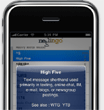 Hi, my name is Erin and I am the founder of NetLingo.com ;-) If you are new to the NetLingo Facebook page or NetLingo Blog, I want to personally welcome you!
Hi, my name is Erin and I am the founder of NetLingo.com ;-) If you are new to the NetLingo Facebook page or NetLingo Blog, I want to personally welcome you!
People tell me everyday "it's tough to keep up with all of this new technology!" I tell them "you're not alone!" It used to be that understanding the Internet was only for computer professionals and web design folks. Now you see technology permeating our lives everywhere and you realize that knowing Internet technology and online communication is no longer a luxury, it's a necessity.
Research shows technology continues to proliferate... there's new software, new hardware, new technologies, new websites, new online services, and new lingo created literally every day. If you're a professional who feels like you're on information overload or a parent who wants to keep up with what your kids are talking about, NetLingo can help you!
Why does NetLingo exist? To track new Internet terms and text and chat acronyms. Others can do that but NetLingo is unique because it’s written by a woman using layman’s language, we are the oldest site who specializes in Internet terms, we have the largest list of text and chat acronyms, and we offer a service that is organized to educate, entertain, and empower you.
NetLingo.com has thousands of definitions that explain the online world of business, technology, and communication, including the largest list of text and chat acronyms. We help everyone from students, teachers, parents, and seniors, to gamers, designers, and techies, to bloggers, journalists, and industry professionals worldwide. NetLingo has been the leading Internet dictionary since 1994 helping millions of people each month understand this new jargon.
Below are just a few of the useful, relevant, and reliable features that can help you learn more each month!
- Content is King
The NetLingo Dictionary is structured in an easy-to-read layout and filled with easy-to-understand definitions. Compiled by a woman using layman's language, Erin's purpose is to educate, entertain, and empower you about the language used in the online world. All definitions are cross referenced and sorted by Category to give you the big picture. We encourage you to Add Your Own Lingo and Become an Editor. - Word of the Day Emails
Sign up to receive any or all four of our popular Word of the Day emails. You can get a daily Online Jargon Term, Online Business Term, Technology Term, and the Acronym of the Day. It's an easy way to learn a little bit at a time... Subscribe here! - Feeds and Widgets
It's a brave new world and NetLingo understands you want your information whenever and wherever you go, that's why we provide content in various Feeds and Widgets. Once you get the hang of it, you'll love it. You can even subscribe to these feeds so they automatically appear on your "My Yahoo" and "iGoogle" pages: Acronym of the Day, Jargon Word of the Day, New and Updated Terms, and Improve Your Internet IQ Blog. Plus, you can friend NetLingo and follow us on Facebook, MySpace and Twitter! - Tips and Tools to Get With The Program
We also understand the power of search, that's why we created a Toolbar that lives on your browser and a Search and Browse Box that lives on your website or blog. In addition to our popular Pocket Dictionary, NetLingo is loaded with tips to help you easily learn and reference online information, from Country Codes to File Extensions, from Top 50 Lists to Cyber Safety Statistics, NetLingo offers a free Blog and a paid subscription service called Get With The Program for parents and professionals to stay up-to-date on issues that matter. - Books, apps & PDFs
NetLingo publishes several products including our new book "NetLingo The List: The Largest List of Text & Chat Acronyms" and our "NetLingo iPhone app The List: Text & Chat Acronyms". You can still order the original book "NetLingo The Internet Dictionary" along with a series of NetLingo PDF Guides. We're also proud to offer a wide range of recommended reading books and geek gifts.
At NetLingo, our first commitment is you. We are dedicated to providing you the best Internet information and resources possible in order to empower you and your family to enjoy an active online life. To ensure that we live up to our commitment, we keep our content up-to-date and written in our signature style so everyone can easily understand the most amazing invention of our time: the Internet.
If you have any questions regarding NetLingo, don't hesitate to contact me personally.
See you online!
Erin Jansen
Founder, NetLingo.com
About NetLingo:
NetLingo.com is a definitive guide to Internet culture. In business since 1994, we are a consumer-technology publishing company and provider of personalized Internet information and educational tools. These tools motivate tech-conscious people like you to learn, understand and grow in your knowledge of hardware, software and online technology, business and communication. NetLingo has been featured on national radio and television programs including CNN, MSNBC, BBC, Fox News, Good Morning America, The Martha Stewart Show, and NPR, as well as in The Wall Street Journal, The New York Times, The San Francisco Chronicle, Good Housekeeping, Real Simple, and many more newspapers and magazines.



































